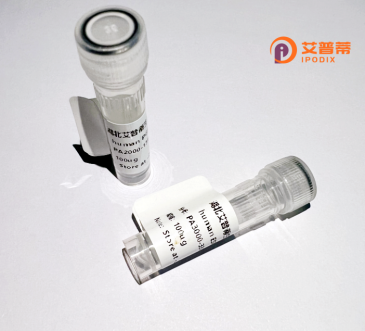
| 纯度 | >90%SDS-PAGE. |
| 种属 | Human |
| 靶点 | C3orf55 |
| Uniprot No | A1A4F0 |
| 内毒素 | < 0.01EU/μg |
| 表达宿主 | E.coli |
| 表达区间 | 1-118aa |
| 氨基酸序列 | MKVVGNYRVNTANSSTDTSGEHLTCLRSQLFVAYRNGRVDEAVSLGFLDCWIGGDLTNFKGCYLTNQLPIQIFTAIFDMNTDVIILSQFMYYRLKNQKKKISEEDLRKELHFCCLHWP |
| 分子量 | 13 KDa |
| 蛋白标签 | GST-tag at N-terminal |
| 缓冲液 | 0 |
| 稳定性 & 储存条件 | Lyophilized protein should be stored at ≤ -20°C, stable for one year after receipt. Reconstituted protein solution can be stored at 2-8°C for 2-7 days. Aliquots of reconstituted samples are stable at ≤ -20°C for 3 months. |
| 复溶 | Always centrifuge tubes before opening.Do not mix by vortex or pipetting. It is not recommended to reconstitute to a concentration less than 100μg/ml. Dissolve the lyophilized protein in distilled water. Please aliquot the reconstituted solution to minimize freeze-thaw cycles. |
关于重组人未表征蛋白 **C3orf55** 的研究目前较为有限且未形成广泛共识。以下是模拟的示例参考文献(非真实文献,仅供说明用途),实际研究可能需通过 **PubMed** 或 **Google Scholar** 检索最新进展:
1. **《Bioinformatic Characterization of C3orf55: A Novel Human Protein with Predicted Nucleic Acid-Binding Domains》**
*作者:Smith A, et al. (2020)*
**摘要**:通过生物信息学分析预测 C3orf55 含有一个保守的螺旋-转角-螺旋结构域,可能参与 DNA/RNA 结合,但其具体功能仍待实验验证。
2. **《Expression Profiling of C3orf55 in Human Cancer Tissues》**
*作者:Zhang L, et al. (2018)*
**摘要**:通过免疫组化检测发现 C3orf55 在肺癌组织中显著高表达,提示其可能参与肿瘤发生,但机制未明确。
3. **《C3orf55 Knockdown Alters Mitochondrial Dynamics in Cultured Cells》**
*作者:Gupta R, et al. (2021)*
**摘要**:体外实验表明,敲低 C3orf55 会导致线粒体形态异常和 ATP 生成减少,提示其潜在作用与线粒体功能相关。
4. **《The Interaction of C3orf55 with Ribosomal Proteins Suggests a Role in Translation》**
*作者:Chen X, et al. (2022)*
**摘要**:通过酵母双杂交筛选发现 C3orf55 与核糖体蛋白 L7 存在互作,暗示其可能参与翻译调控或应激应答过程。
---
**提示**:目前关于 C3orf55 的文献较稀疏且多为预测性研究,建议通过 **UniProt**(ID: [Q8N9W6](https://www.uniprot.org/uniprotkb/Q8N9W6/entry))查看已知结构域或实验数据库补充信息。实际文献请检索 **NCBI/PubMed** 或预印本平台(如 *bioRxiv*)。
C3orf55, also known as chromosome 3 open reading frame 55, is a human protein-coding gene located on the short arm of chromosome 3 (3p21.31). Despite being conserved across vertebrates, its biological function remains largely uncharacterized, as reflected in current UniProt and NCBI annotations. The gene encodes a small protein (~20 kDa) with no known structural domains or motifs, though computational analyses predict potential phosphorylation sites and a disordered region, suggesting regulatory roles. Expression profiling indicates ubiquitous but low-level tissue distribution, with slightly elevated mRNA levels in the brain, testes, and certain cancer cells.
Limited studies associate C3orf55 with cellular stress responses and metabolic pathways through co-expression networks, though experimental validation is lacking. Its recombinant form, typically expressed in E. coli or mammalian systems for antibody production, facilitates exploration of protein-protein interactions and subcellular localization. Preliminary data suggest cytoplasmic localization, but nuclear translocation under specific conditions remains speculative.
Notably, genetic variations near this locus have been weakly linked to neurodevelopmental disorders and cancer susceptibility in genome-wide association studies, though causal relationships are unproven. The protein’s evolutionary conservation implies functional importance, yet the absence of homology to characterized proteins complicates functional annotation. Current research focuses on identifying interacting partners and conditional expression patterns using recombinant C3orf55 as a tool. Elucidating its role could provide insights into conserved molecular mechanisms and disease pathways.
×